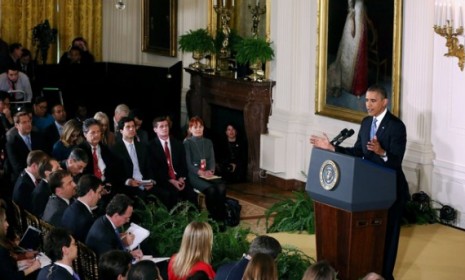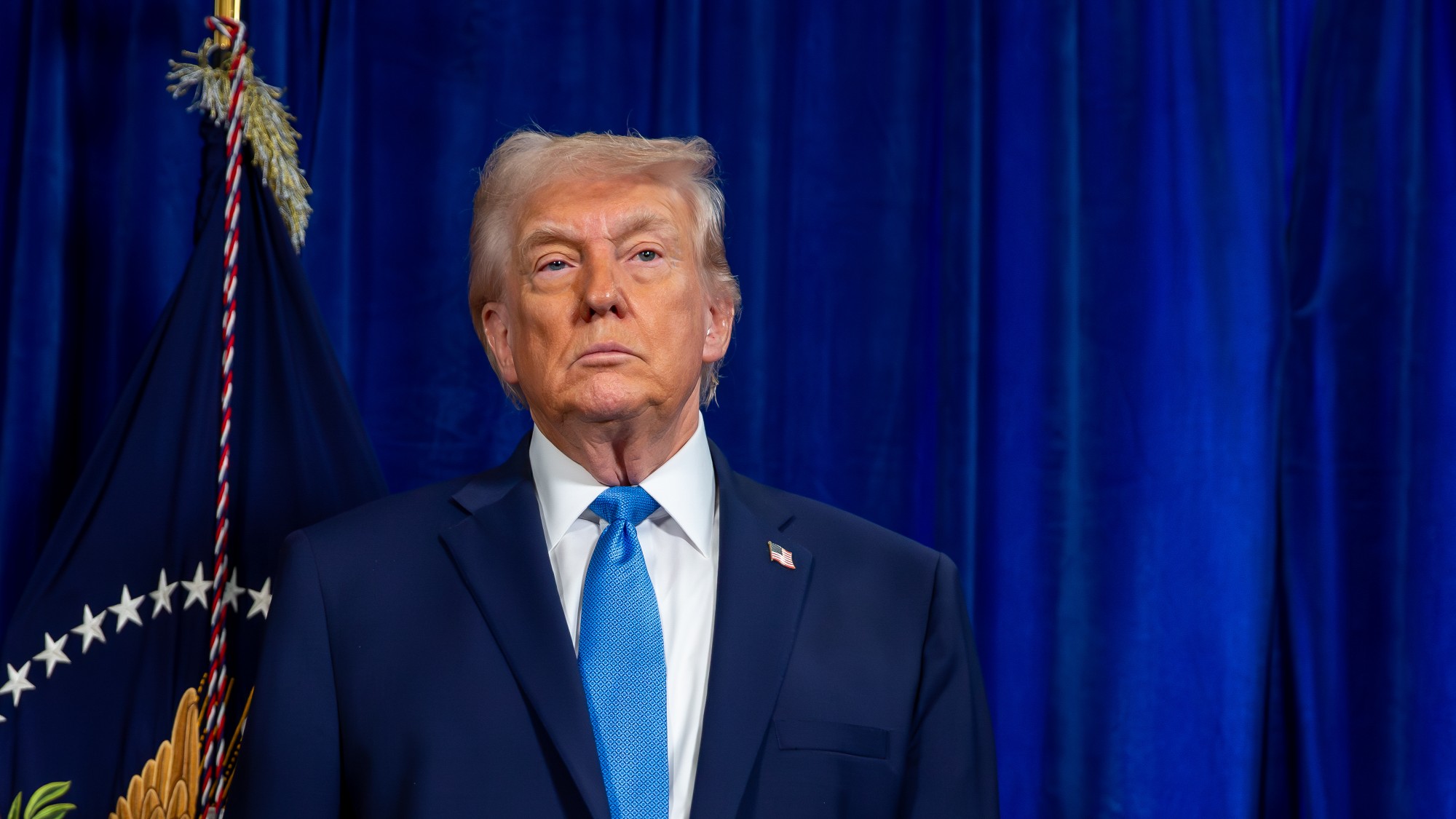President Obama's first post-election news conference: 4 takeaways
The president meets the press, and his responses to their questions give us some intriguing clues about where he's headed in his second term

A free daily email with the biggest news stories of the day – and the best features from TheWeek.com
You are now subscribed
Your newsletter sign-up was successful
On Wednesday afternoon, President Obama, in his first news conference since winning re-election, reiterated his promise to work with Republicans to create jobs and improve the economy. Judging by the barrage of tough questions he faced, however, he'll be confronted with one politically charged issue after another as he prepares to begin his second term. The reporters who filled the East Room of the White House for Obama's first full-fledged question-and-answer session in eight months pressed him on everything from the fiscal cliff to the David Petraeus affair, and from taxes to climate change. Here's how Obama responded on four of the most controversial issues he's facing:
1. Taxes and the fiscal cliff
The looming "fiscal cliff" has Washington's attention, with the potentially devastating collection of spending cuts and tax hikes scheduled to automatically take effect at year's end. Obama vowed to avert calamity by pushing through a deficit-reduction deal. He reiterated his pledge that any agreement would have to increase taxes on the wealthy, meaning he wouldn't agree to extending Bush-era tax cuts for families making more than $250,000. He said Congress has a choice: Let all the Bush cuts expire, or extend the breaks for people who make less than $250,000. In other words, says the Baltimore Sun in an editorial, "Republicans who think they can blackmail the president into backing down on that question, as he did two years ago, had better think again."
The Week
Escape your echo chamber. Get the facts behind the news, plus analysis from multiple perspectives.

Sign up for The Week's Free Newsletters
From our morning news briefing to a weekly Good News Newsletter, get the best of The Week delivered directly to your inbox.
From our morning news briefing to a weekly Good News Newsletter, get the best of The Week delivered directly to your inbox.
2. The David Petraeus affair
Obama was clearly ready for questions on the resignation last week of his CIA director, David Petraeus, and the extramarital affair that provoked it. Obama praised Petraeus for his service to the country, both in the CIA and in the military. The president also offered assurances that national security had not been compromised by Petraeus' affair with his biographer, Paula Broadwell. "Obama chose his words carefully and made sure to emphasize that he was withholding judgment until a fuller picture of the situation emerged," says Chris Cillizza at The Washington Post. He said he had "no evidence," for example, that classified information had been disclosed that would undermine national security. Thanks to cautious remarks like that, "Obama was able to keep the Petraeus matter on the backburner," which is just where he needs it to be as he presses ahead on the fiscal cliff and putting together his next cabinet.
3. Benghazi
The subject of the deadly Sept. 11 attack on the U.S. Consulate came up in the context of Obama's effort to put together his next cabinet. One reporter asked Obama for his response to comments from Republican Sens. John McCain and Lindsey Graham, who warned that they would do everything in their power to prevent U.N. Ambassador Susan Rice from becoming the next secretary of state if Obama nominates her, because of statements she made suggesting the attack might not have been a planned act of terrorism. Obama bristled. "If Sen. McCain and Sen. Graham, and others want to go after somebody, they should go after me," he said. "And I'm happy to have that discussion with them. But for them to go after the U.N. ambassador who had nothing to do with Benghazi, and was simply making a presentation based on intelligence that she had received? And to besmirch her reputation is outrageous." Wow, says Peter Nicholas at The Wall Street Journal. For a guy who's "known to be emotionally reserved, the president showed some fire in defending U.N. Ambassador Rice."
A free daily email with the biggest news stories of the day – and the best features from TheWeek.com
After Hurricane Sandy, New York City Mayor Michael Bloomberg endorsed Obama over Mitt Romney, citing the Democrat's policies on climate change — which some said stoked Sandy's fury. Obama was asked whether he'd be willing to go as far as, say, considering a tax on carbon to reduce emissions of greenhouse gases. "I am a firm believer that climate change is real, that it is impacted by human behavior," Obama said. He added, however, that Republicans and Democrats would have to make "some tough political choices" to make a dent in the problem, and he wouldn't support any policies that would hurt job growth. Translation: Americans are too worried about the economy to ask businesses to spend money to cut pollution, says Richard Adams at Britain's Guardian: "So, don't hold your breath (even if it does reduce carbon emissions)."
-
 Touring the vineyards of southern Bolivia
Touring the vineyards of southern BoliviaThe Week Recommends Strongly reminiscent of Andalusia, these vineyards cut deep into the country’s southwest
-
 American empire: a history of US imperial expansion
American empire: a history of US imperial expansionDonald Trump’s 21st century take on the Monroe Doctrine harks back to an earlier era of US interference in Latin America
-
 Elon Musk’s starry mega-merger
Elon Musk’s starry mega-mergerTalking Point SpaceX founder is promising investors a rocket trip to the future – and a sprawling conglomerate to boot
-
 The billionaires’ wealth tax: a catastrophe for California?
The billionaires’ wealth tax: a catastrophe for California?Talking Point Peter Thiel and Larry Page preparing to change state residency
-
 Bari Weiss’ ‘60 Minutes’ scandal is about more than one report
Bari Weiss’ ‘60 Minutes’ scandal is about more than one reportIN THE SPOTLIGHT By blocking an approved segment on a controversial prison holding US deportees in El Salvador, the editor-in-chief of CBS News has become the main story
-
 Has Zohran Mamdani shown the Democrats how to win again?
Has Zohran Mamdani shown the Democrats how to win again?Today’s Big Question New York City mayoral election touted as victory for left-wing populists but moderate centrist wins elsewhere present more complex path for Democratic Party
-
 Millions turn out for anti-Trump ‘No Kings’ rallies
Millions turn out for anti-Trump ‘No Kings’ ralliesSpeed Read An estimated 7 million people participated, 2 million more than at the first ‘No Kings’ protest in June
-
 Ghislaine Maxwell: angling for a Trump pardon
Ghislaine Maxwell: angling for a Trump pardonTalking Point Convicted sex trafficker's testimony could shed new light on president's links to Jeffrey Epstein
-
 The last words and final moments of 40 presidents
The last words and final moments of 40 presidentsThe Explainer Some are eloquent quotes worthy of the holders of the highest office in the nation, and others... aren't
-
 The JFK files: the truth at last?
The JFK files: the truth at last?In The Spotlight More than 64,000 previously classified documents relating the 1963 assassination of John F. Kennedy have been released by the Trump administration
-
 'Seriously, not literally': how should the world take Donald Trump?
'Seriously, not literally': how should the world take Donald Trump?Today's big question White House rhetoric and reality look likely to become increasingly blurred